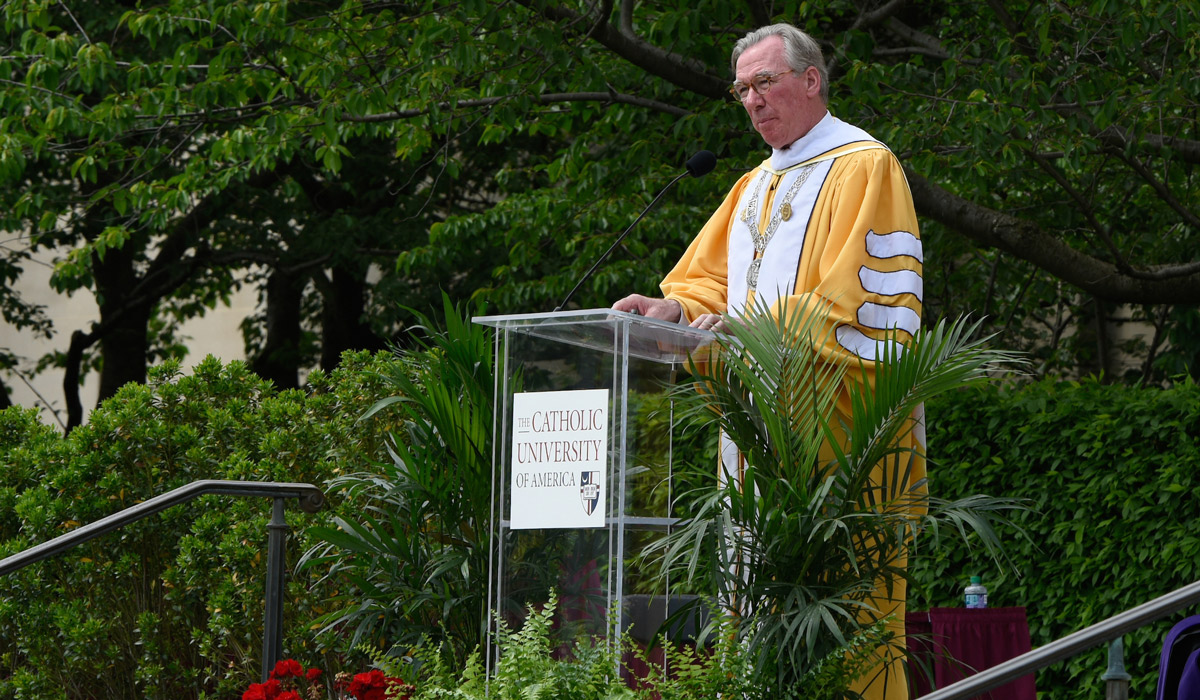

John Garvey, President of The Catholic University of America
Commencement Remarks
129th Annual Commencement
East Portico, Basilica of the National Shrine of the Immaculate Conception
May 12, 2018
My wife and I have moved a lot during the course of our marriage. Wherever we move, we bring with us an old painted canvas that hangs in the entryway of our house. It says “Let all guests be received as Christ.” The injunction comes from chapter 53 of the Rule of St. Benedict. The Rule goes on to say that “[i]n the reception of the poor and of pilgrims the greatest care and solicitude should be shown, because it is especially in them that Christ is received.”
It’s a little surprising that an institution like the Order of St. Benedict could survive for 1500 years with such an open-handed business model. But there are some protections against the abuse of its hospitality. There is a porter at the door to bar visitors bent on mischief. And guests looking to sponge for the long term may find that a life of prayer and work (the Order’s motto is “ora et labora”) is not for them.
Still, the default rule is the open door because “Christ himself . . . promised that on the last day he will say: I was a stranger and you welcomed me.”
The religious tradition of hospitality, as St. Benedict well knew, is older than the Christian faith. Genesis recounts how Abraham, camped by the oaks of Mamre, invited three strangers to rest with him, wash their feet, and be fed. Turns out it was it was the Lord visiting him. Because of his righteousness, God not only promised him a son, but foretold that he should be the father of a great and mighty nation.
What’s this got to do with you and your commencement? You might take it as advice about how to vote on a hot political issue. We might find, as Abraham and Benedict did, that in welcoming strangers to our shores we are entertaining angels unawares. The people we honor today knocked on America’s door, and have amply repaid our kindness.
But we need to be careful about transposing rules for religious communities to the United States Code. Thomas Aquinas wisely observes that “Human law . . . does [not] prescribe all acts of virtue.”1. It might be that way with hospitality.
So let me suggest that you begin by considering how it applies to your own lives. You are moving out of your parents’ home (or so they hope). You are also leaving the familiar embrace of your alma mater for the wide world, where nearly everyone is a stranger. Henri Nouwen, one of my wife’s favorite spiritual writers, observed that “[i]n our world the assumption is that strangers are a potential danger and that it is up to them to disprove it.”2.
In fact, we have protected our apartments with dogs and double locks, our buildings with vigilant doormen, our roads with anti-hitchhike signs, our subways with security guards, our airports with safety officials, our cities with armed police and our country with an omnipresent military.
He recommends that we begin the practice of hospitality by opening our hearts. Leave that door ajar so strangers feel welcome. Don’t turn people away because they look different from your old friends.
Keep in mind the difference between hospitality and commerce. Tom Bodett says Motel 6 will leave the light on for you; but they’ll charge you $104 for the service. Hospitality makes no demands on the guest. It’s more like friendship than a business deal. In fact the German word for it is Gastfreundschaft — guest friendship.
Here’s a last thing. The space in our hearts must be not just open and free but warm. Hospitality demands that we offer the stranger a lodging among people who treat one another with kindness. As a child I loved above all things to go next door and sit with my grandparents in their library. What made it so inviting wasn’t just that I was always welcome. It was their love for one another. They’d been married for 50 years and there were no land mines between them that I had to walk carefully around. There was no nicer place to be than inside that circle.
You’re leaving here with just your education. You don’t have a big house to receive guests in. But that’s no impediment to practicing hospitality. It’s a good virtue to begin life with. You will make some friends. You will bring an open heart to the responsibilities of citizenship. You will build a loving home. And there you might some day receive Christ.
1. Summa Theologica, I-II, Q. 96, art. 3.
2. Henri J.M. Nouwen, Reaching Out 68-69 (1975).